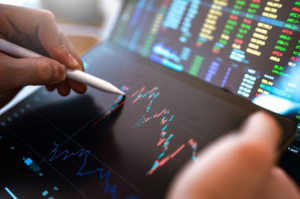What is a trader? What does its activity consist of? What characteristics distinguish him from the investor? How to become a trader? Our instructions for getting started in trading and with what budget? From choosing a stock market broker to developing a trading plan, including the use of stock market tools, Café de la Bourse goes over the fundamentals and presents its advice to you to become a better stock market trader.
Discover the pitfalls to avoid, our portrait of the best traders and our selection of trading training for all those who wish to become a stock market trader.
Trading: what is a trader?
You may be wondering, what is a trader? What is trading? And above all, what are the differences between trading and investing? A trader is a person who buys and sells financial products on stock markets. Trading therefore means positioning yourself on financial assets with the aim of realizing a capital gain at the time of resale. In this sense, a trader is, for example, different from a financial analyst whose job is to carry out studies of companies listed on the stock exchange and to monitor macroeconomic news, in particular in order to advise traders and traders in their positions. portfolio managers.
In the imagination of many people, the trader is distinguished from the investor by the duration of his positions. Believing that investors are generally positioned for the long term, and that traders favor short-term gains. While it is true that some traders only hold their positions for a few seconds, a trader can also hold a position for several months. The real difference between a trader and an investor lies in the objective which motivates them to intervene in the financial markets. While the objective of an investor is to grow his capital through accumulation, the trader is a trader who seeks to resell at a higher price what he has purchased.
There are also robot traders who allow you to practice algorithmic trading. This is systematic trading (buy and sell orders are based on algorithms) as opposed to discretionary trading (buy and sell orders are based on the decision of the trader who executes the order).
Automated trading can concern the individual investor who will then invest via a robot trader. But it is mainly the work of financial institutions (banks, management companies and hedge funds ) which practice it on a large scale: this is what we call high-frequency trading . This form of trading allows you to generate profits via millions of automated microtransactions.
Trading, is it a job? Yes of course ! But be aware that there are two types of traders: the salaried trader and the independent trader.
The salaried trader is a market operator whose salary is fixed, and who in certain cases can receive a bonus, but depending on the goodwill of his hierarchy. While the myth leads us to imagine a trader working in a trading room within a bank or a hedge fund, many traders work in groups like Danone or TotalEnergie . The salaried trader’s mission is therefore generally not to speculate on the markets, but more often to manage and attempt to neutralize market risks (currency riskfor example) to which the employing company is exposed. Bank traders are in most cases operators whose role is to enter the purchase and sale transactions of the bank’s clients, and this is more of a stock broker role.
In 2023, salaried traders who take pure speculation positions will become rare in banks. Algorithmic trading has become so important that the majority of job offers are “Quant Trader” and require excellent programming skills.
The independent trader, who trades for his own account (he is often called an own account trader), works for himself and his income corresponds to his earnings. He does not receive a salary since he is independent.
There are therefore several statuses of traders which cover very different realities.
In this article, we will focus on introducing you to the activity of own account trading and detailing the best practices to put in place when you want to become an independent trader.
You may be wondering who can trade on their behalf? In theory, anyone can become a home trader. You will still have to learn about trading and devote a large part of your time to it. However, it is possible to be a self-taught trader and earn an income from it.
You don’t want to go that far and want to keep another professional activity but you’re wondering how to trade when you’re working? It’s more complicated but also entirely possible. This will only require more organization and will partly determine your trading style and the assets traded. It will be easier to trade currencies or cryptos in the evening than to scalp stocks in the middle of the morning if you have a very busy job.
Part-time trading may also be possible with swing trading strategies and medium-term positions, but also with automatic trading provided you have a complete and suitable computer setup.
According to a 2021 study carried out by “Investment Trends”, there are nearly 38,000 individual traders in France. The traders included in this study are traders who have actively traded on over-the-counter markets with leveraged products. However, we can assume that the arrival of cryptocurrency trading

